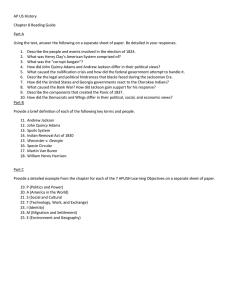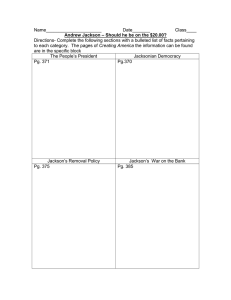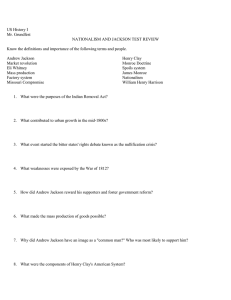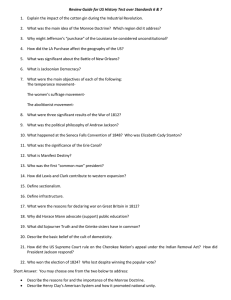Unit II Study Guide-Textbook.doc
advertisement
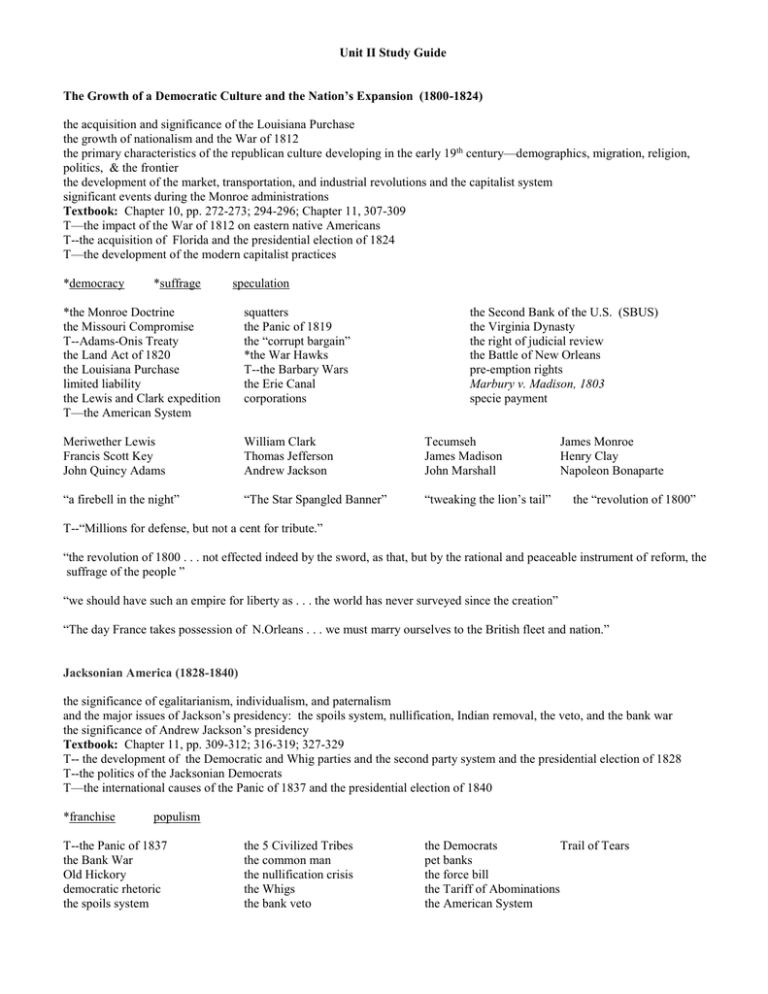
Unit II Study Guide The Growth of a Democratic Culture and the Nation’s Expansion (1800-1824) the acquisition and significance of the Louisiana Purchase the growth of nationalism and the War of 1812 the primary characteristics of the republican culture developing in the early 19th century—demographics, migration, religion, politics, & the frontier the development of the market, transportation, and industrial revolutions and the capitalist system significant events during the Monroe administrations Textbook: Chapter 10, pp. 272-273; 294-296; Chapter 11, 307-309 T—the impact of the War of 1812 on eastern native Americans T--the acquisition of Florida and the presidential election of 1824 T—the development of the modern capitalist practices *democracy *suffrage speculation *the Monroe Doctrine the Missouri Compromise T--Adams-Onis Treaty the Land Act of 1820 the Louisiana Purchase limited liability the Lewis and Clark expedition T—the American System squatters the Panic of 1819 the “corrupt bargain” *the War Hawks T--the Barbary Wars the Erie Canal corporations the Second Bank of the U.S. (SBUS) the Virginia Dynasty the right of judicial review the Battle of New Orleans pre-emption rights Marbury v. Madison, 1803 specie payment Meriwether Lewis Francis Scott Key John Quincy Adams William Clark Thomas Jefferson Andrew Jackson Tecumseh James Madison John Marshall “a firebell in the night” “The Star Spangled Banner” “tweaking the lion’s tail” James Monroe Henry Clay Napoleon Bonaparte the “revolution of 1800” T--“Millions for defense, but not a cent for tribute.” “the revolution of 1800 . . . not effected indeed by the sword, as that, but by the rational and peaceable instrument of reform, the suffrage of the people ” “we should have such an empire for liberty as . . . the world has never surveyed since the creation” “The day France takes possession of N.Orleans . . . we must marry ourselves to the British fleet and nation.” Jacksonian America (1828-1840) the significance of egalitarianism, individualism, and paternalism and the major issues of Jackson’s presidency: the spoils system, nullification, Indian removal, the veto, and the bank war the significance of Andrew Jackson’s presidency Textbook: Chapter 11, pp. 309-312; 316-319; 327-329 T-- the development of the Democratic and Whig parties and the second party system and the presidential election of 1828 T--the politics of the Jacksonian Democrats T—the international causes of the Panic of 1837 and the presidential election of 1840 *franchise populism T--the Panic of 1837 the Bank War Old Hickory democratic rhetoric the spoils system the 5 Civilized Tribes the common man the nullification crisis the Whigs the bank veto the Democrats Trail of Tears pet banks the force bill the Tariff of Abominations the American System Martin van Buren John Quincy Adams William Henry Harrison Henry Clay Cherokee Nation v. Georgia, 1831 Worcester v. Georgia, 1832 John C. Calhoun the South Carolina Exposition Democracy in America “The bank is trying to kill me . . . but I will kill it.” “Our Union, it must be preserved.” Andrew Jackson “An unchecked majority is a despotism.” the “tyranny of the majority” “boom or bust” “a ward to his guardian” “hang out his shingle” “Please give my compliments to my friends in your state, and say to them, that if a single drop of blood shall be shed there in opposition to the laws of the United States, I will hang the first man I can lay my hands on engaged in such treasonable conduct, upon the first tree I can reach.” “the preservation of the rights of the several states and the integrity of the Union.” “a ward to his guardian” “distinct political communities, having territorial boundaries” “The bank . . . is trying to kill me, but I will kill it.” “Tippecanoe and Tyler Too” “the tyranny of the majority.” “Log Cabin and Hard Cider” “King Andrew I, the most absolute despot now at the head of any representative government.” “Equality of talents, of education or of wealth can not be produced by human institutions . . . . Every man is equally entitled to protection by law; but when the laws undertake to add to these natural and just advantages artificial distinctions, to grant titles, gratuities, and exclusive privileges, to make the rich richer and the potent more powerful, the humble members of our society—the farmers, mechanics, and laborers—who have neither the time nor the means of securing favors to themselves, have the right to complain of the injustice of their Government.”

